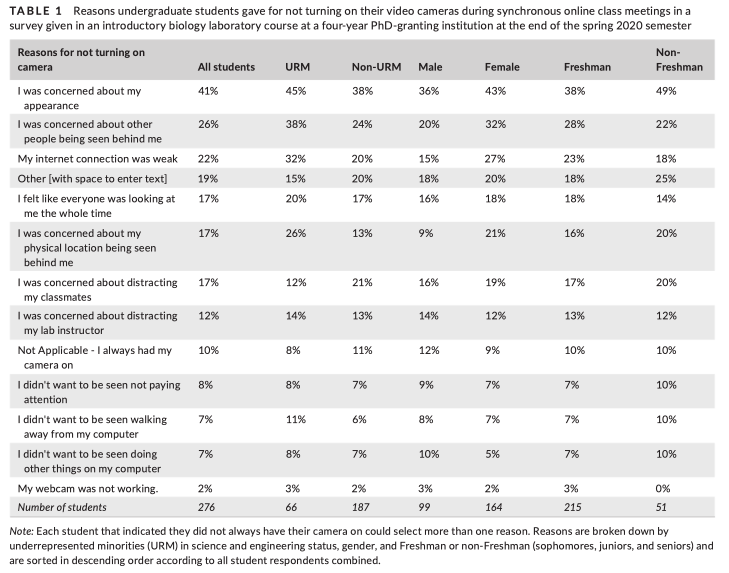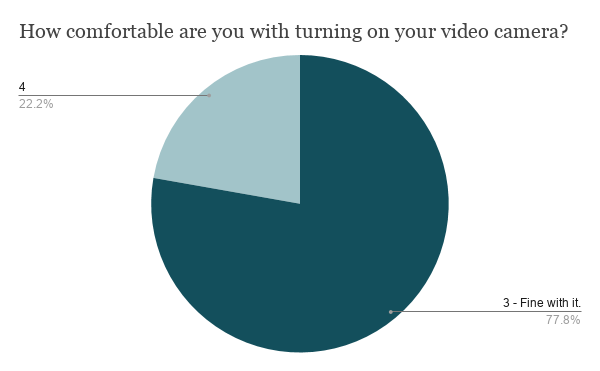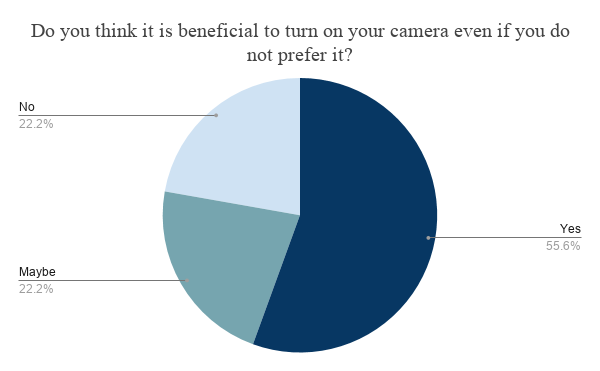Reasons why students don't turn on their web cameras
- May 8, 2021
- 4 min read

In light of the Covid-19 pandemic, remote learning has become the norm during 2020 and 2021. As we have shifted to online learning models, educators have wondered whether students should be required to keep their video cameras on during class. Most educators agree it is unfair to mandate students to turn on their web cameras during class in order to avoid creating additional stressors on top of the ones already posed by the pandemic. However, they will often ask or encourage students to do so in order to gauge how students are feeling, foster a better sense of connections between students and instructors, and to avoid the feeling of teaching into an abyss. While students might have turned their cameras on at first, professors noticed that more and more students chose to leave their cameras off by the end of the semester.
A recent study conducted by researchers at Cornell University surveyed students to get a better understanding of why they chose not to turn on their web cameras during class. The sample was composed of 276 undergraduate students enrolled in the Investigative Biology Laboratory course at Cornell University from the spring semester of 2020. The survey was conducted at the end of the semester. One of the main questions presented by the study was: “If you ever left your video off during the live Zoom lab meetings, why did you leave it off? (check all that apply).” Students had 12 reasons to select from, in addition to an "other" option where they could provide a reason not listed and elaborate. The following table summarizes the results of this survey question.

Out of the provided answer choices, one of the most selected options was that students were concerned about their appearance. Other frequently selected options relate to reasons about concern over background appearance and weak internet connection. Almost twenty percent of respondents provided an answer for the "other" selection. Of those who provided an additional reason, nearly half of these respondents indicated their reason had to do with having cameras off "being the norm." In other words, they did not turn their web cameras on because their peers did not have their cameras on.
"Everyone else had their camera off" - Anonymous student from Cornell study
Based this study, we decided to survey our own computer science ethics class at the University of Virginia to get an insight into why our own peers might not turn on their web cameras. We based our survey questions off of the Cornell study survey questions. Out of a class of 25 students, we got nine survey responses and analyzed those results.

We asked our classmates to rank how comfortable they felt with turning on their video cameras during class on a scale of 1 to 5, where 1 is the least comfortable and 5 is very comfortable with having it on. The majority of the respondents were in the middle, indicating they did not feel too strongly about having their cameras on or off. A few respondents felt a little more comfortable with turning their camera on, and no respondents felt very strongly about either turning their cameras on or off. Students had the option to elaborate on why they chose their answer.
"Sometimes I am okay with turning it on but other times I don't - it mostly depends on the context of the zoom meeting" - Anonymous Student in UVA CS ethics class
Similar to the survey question from the Cornell study, we asked our classmates why they might not turn on their video cameras during class. We based our multiple-selection options off of the study's options, and added the option of having cameras off being "the norm."
Possible reasons for not turning on your camera:
Concerned about my appearance
Concerned about other people being seen behind me
Weak Internet connection
Felt like other people were looking at me (being judged)
Concerned about my physical location being seen behind me
Concerned about distracting my classmates
Concerned about distracting my instructor
Did not want to be seen not paying attention
Did not want to be seen walking away from my computer
Webcam was not working
If everyone else has their camera off
None of the above
Other
Our class's results were similar to the results given by the students at Cornell. The most selected answer choice was "if everyone else has their camera off," followed by "concerned about my appearance." These two reasons were selected by all but one and all but two, respectively. Other well-selected answer choices included reasons 3, 5, 8, 9, and 10.
Based on our class's survey results and the published study results, it is evident that many students chose not to turn on their cameras based off of unspoken norms and appearance concerns. We have a related blog post that details suggestions for educators to encourage their students to turn on their video cameras during class.

Our final question asked students if they thought turning their video cameras on could be beneficial, even if they themselves did not turn their cameras on. The majority of the respondents (55.6%) answered "yes," and the rest of the respondents split their answers between "no" and "maybe."
Reasons students believe it is beneficial include that having cameras on makes it feel like more like a real class or makes people feel comfortable.
"It is the best way to feel connected to others and like you are in an actual class rather than just a seminar. It is especially helpful with presentations." - Anonymous Student in UVA CS ethics class
However, there were also reasons for why cameras on might not be the best option. One respondent felt that while it may be beneficial, it can also be draining. There are different circumstances that might lead a student to keep their camera off.
"People have different circumstances where they may not be able to turn their camera on or would feel more comfortable learning with their camera turned off." - Anonymous Student in UVA CS ethics class
There are a number of different reasons why students choose to have their video cameras on or off during class. An interesting finding is that students tend to follow an unspoken classroom norm, and will make the decision to turn on or off their cameras based on what most of their peers are doing. Additionally, there are mixed results as to whether students feel turning video cameras on is beneficial. It will be interesting to see whether the video camera debate will be relevant in the near future, as we start making a return to in-person learning.



Comments